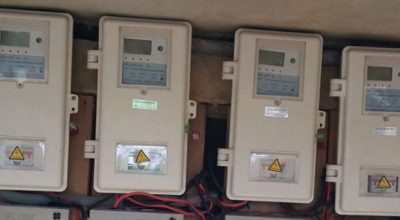Only 1.6 million consumers are using prepaid meters in Nigeria

The National Bureau of Statistics (NBS) has released the Power Sector Report for the second quarter of 2018. The report which shows energy generated, sent out, consumed and load allocation indicates that power stations in Nigeria generated a total average of 81,561Mwh of energy in Q2 2018.
According to the report, Nigerian daily energy generation during the period under review peaked at 98,573Mwh on April 18, 2018. Energy generation by Therma (otherwise known as gas) stations peaked at 77,010 Mwh on the same April 18, 2018. On the other hand, Nigerian hydro stations attained a peak of 22,858 MWh in Q2 2018 on June 28, 2018. Also, Nigeria’s lowest daily energy generation in Q2 2018 was 52,074 MWh of energy attained on June 9, 2018.
Meanwhile, the report also shows that the total number of Nigerian consumers with Prepaid Meters (PPM) in the second quarters of 2018 stood at 1.62 million. This shows an increase of 1.59% from 1.59 million customers in the previous quarter of Q1 2018.
Out of the 1.62 million prepaid-metered customers in Q2 2018, Benin Electricity Distribution Company (BEDC) accounted for the highest number of customers with 282,868, which is the same number of customers they also metered in Q1 2028. They are closely followed by Abuja Disco with 270,918 metered customers and Ibadan Disco with 254,261 in that order. The least total number of metered customers during the period under review was recorded by Yola Disco with a total of 37,329 customers.
The NBS report also revealed that a total of 6,081,958.65 Mwh of electricity was consumed in Nigeria in the second quarter of 2018. Leading the pack of the load participants was Ikeja Electric which consumed 859,531.24 Mwh of energy. Ibadan Disco, Abuja Disco, Eko Disco and Benin Disco followed in that order with 827,946.70, 823,137.70, 780,551.14 and 610,142.41 MWhs respectively.
In the same vein, the Multi-Year Tariff Order (MYTO) percentage load allocation in Q2 2018 shows that Ikeja Electric Disco got the highest percentage load allocation of 15%. Ibadan Disco came second with load allocation of 13%, while Abuja Disco is third with 11.5%. Eko Disco is next with a load allocation of 11%. Yola Disco with 3.5% has the least percentage load allocation of electricity in the second quarter of 2018.
Estimated Billing vs Prepaid-meter Billing
With just a total of 1.62 million estimated-meter consumers at the end of the quarter ending June 2018 and a quarter on quarter PPM increase of just 1.59% from the previous quarter of Q1 2018, it clearly shows that majority of Nigerian consumers are still without prepaid meters. The report equally shows that most of the Power Distribution Companies (DISCOs) are not ready to issue consumers with PPM, as most of them recorded a PPM increase of 0% in Q2 2018, which means no PPM was issued out to consumers during the period under review. Out of the 11 DISCOs operating in Nigeria, only 3 of them issued PPM to their consumers throughout the second quarter of 2018.
The government has recently been piling huge pressure on DISCOs to work towards ending the estimated billing system, which is subjective and prone to abuse. To this end, the Federal Government recently urged the DISCOs to access the Federal Government N37 billion fund under the Meter Asset Provider (MAP) in a bid to halt estimated billing system.
Speaking recently, the Minister of Power, Works and Housing, Babatunde Fashola, said:
“LET ME BE CLEAR THAT EVERY DISCO IS AFFECTED, AND EVERY DISCO NEEDS TO RESPOND BY PROVIDING METERS QUICKLY AND SEEKING TO END ESTIMATED BILLING, WHICH IS SUBJECTIVE, DISCRETIONARY, AND PRONE TO ABUSE. I THEREFORE, URGE ALL DISCOS WHO HAVE NOT TAKEN BENEFIT OF THIS OPPORTUNITY TO QUICKLY DO SO OR MAKE THEIR OWN FUNDING ARRANGEMENTS TO CONTRACT THEIR OWN METER PROVIDERS TO SUPPLY AND INSTALL METERS.”
The Challenges of DISCOs
Meanwhile, investors in the power sector recently lamented the poor state of power supply in Nigeria insisting that disaster awaits the nation’s electricity supply in the nearest future if certain conditions were not taken. The investors threatened to quit if their monies are not refunded the by Federal Government, claiming to have been sidelined on the issues affecting the power sector value chain in Nigeria. (Nairametrics)

